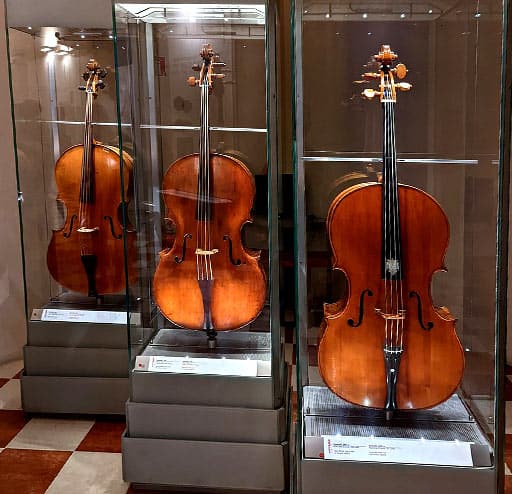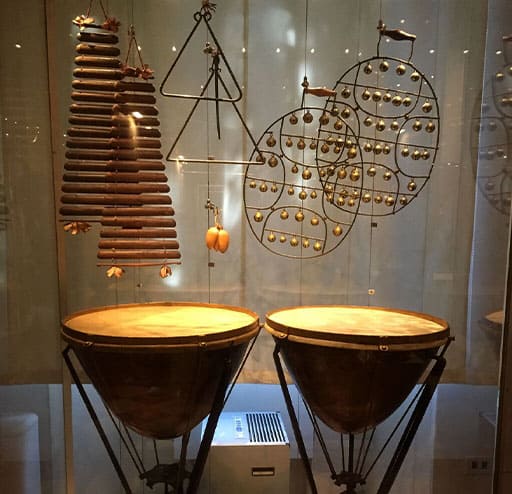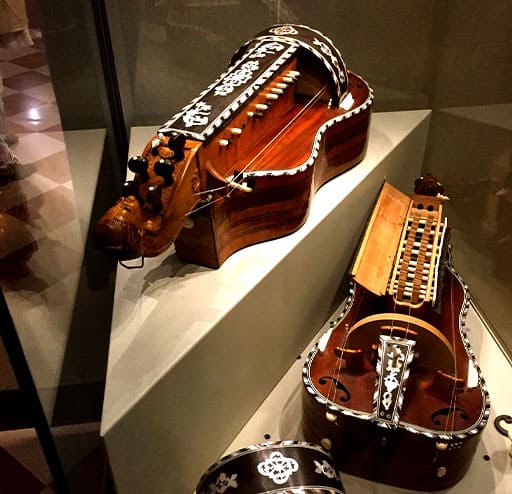MUSEUM OF MUSICAL INSTRUMENTS –
Accademia Gallery
During your Florence journey, the Accademia Gallery is an excellent place to visit if you enjoy opera, theatre, and classical music.
In the wing belonging to the Luigi Cherubini Conservatory, this Museum of Musical Instruments houses over 50 musical instruments belonging to the Grand Ducal collection.
Excellent sound, refined materials, and high aesthetic value of the works demonstrate that music played a primary role in everyday life and official celebrations of the Medicean Court.
A visit to the museum allows visitors to gain a better understanding of the roots of the piano ( “pianoforte” ), as they discover an impressive collection of harpsichords, string instruments, and wind instruments. It was designed by Bartolomeo Cristofori around 1699 for the Medicis.
The Accademia is home to one of the most priceless works in the museum: the unique tenor viola made by Antonio Stradivari in 1690. This viola is made of exceptional quality mother of pearl, ivory, and ebony inlaid with the Medici crest.
The Museum, now part of the Accademia Gallery, houses an ancient and precious collection of musical instruments dating from 1568 to the 20th century. Its original core dates back to the acquisitions made by the Medici Court.

The splendid court dances, concerts, and the first theatrical performances, which originated in Florence in the 1600s within the context of the Camerata de’ Bardi (which included Vincenzo Galilei, father of Galileo), caught the special attention of the Medici rulers, who increasingly patronized the purchase of technically advanced instruments, supporting the work of luthiers and organ builders.
An example is the renowned Bartolomeo Cristofori, who was summoned to Florence in 1698 and created the first piano, although only his description remains. Among the most important instruments in the Museum’s collection are violins, violas, and cellos by Antonio Stradivari, an Amati cello, Domenico Del Mela‘s upright piano, and the Floriani harpsichord. Among the wind instruments are the Giorgi flute, the Briccialdi flute, and a “bimbonifono,” a trombone with a mechanism that allowed even the lowest brass instruments to perform specific virtuosic techniques such as legato and trills.
Giovacchino Bimboni designed it between 1849 and 1870. Enriched with new acquisitions, the collection was transferred from Palazzo Pitti to the “L. Cherubini” Conservatory of Music in 1863 and inaugurated in 1926.
The Museum displays approximately fifty musical instruments from the private collections of the Grand Dukes of Tuscany, Medici, and Lorraine, gathered between the second half of the 17th century and the first half of the 19th century and subsequently passed to the Cherubini Conservatory in Florence.
Since 1996, these instruments have been on loan to the Accademia Gallery. Among them, notable pieces include a tenor viola by Antonio Stradivari. This cello was part of the same quintet made in 1690 for Grand Prince Ferdinand, a Stradivari violin from 1716, and a Niccolò Amati cello from 1650.


The Museum also displays two instruments by Bartolomeo Cristofori, the inventor of the piano, including the oldest surviving upright piano. The instruments are presented alongside paintings depicting scenes of musical life at the Medici court.
A series of computers allow visitors to listen to the sound of all the exhibited instruments and provide information about the musical culture of Grand Ducal Florence. The Museum is part of the Accademia Gallery.



Book Accademia Gallery Tickets Or Guided Tours 2023
Please note that this page includes affiliate links for third-party products and services
Links you might find useful
Tickets & Tours
Accademia Gallery
Visitor Information
Opening Hours
Tickets and Tours
Accademia Online
Radio Accademia
Florence Attractions
Uffizi Gallery
Duomo Florence
Palazzo Pitti
More Florence Attractions
